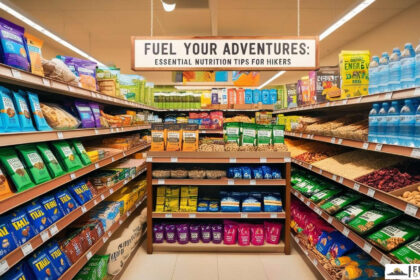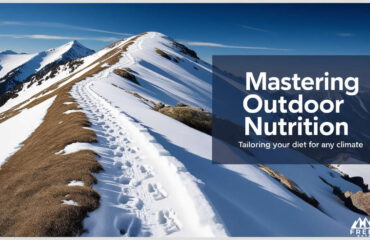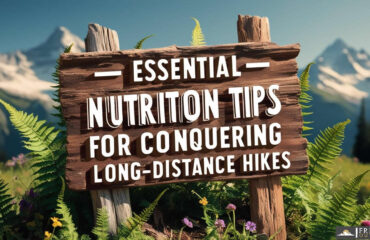
Discover essential nutrition tips to enhance your hiking experience, boost energy, and aid recovery for optimal outdoor adventures.
Understanding the Importance of Nutrition for Hikers
Nutrition plays a critical role in ensuring sustained energy and optimal performance during hikes. When hiking, especially over long distances, the body requires a balance of nutrients to maintain energy levels, support endurance, and facilitate recovery. Proper food choices can significantly enhance the hiking experience, allowing hikers to enjoy their surroundings while minimizing fatigue and the risk of injuries or dehydration. For instance, a well-fueled hiker is less likely to experience sudden drops in energy, which can lead to physical exhaustion and decreased enjoyment of the hike. Studies have shown that hikers who prioritize nutrition often report more enjoyable experiences and improved performance on the trail.
Moreover, nutrition impacts not only physical endurance but also recovery after a hike. Consuming the right balance of carbohydrates, proteins, and fats can help hikers recover more effectively, thus preparing them for their next adventure. For example, athletes often report improved performance and quicker recovery times when they adhere to a balanced nutrition plan tailored to their hiking activities. This is particularly important for multi-day hikes where fatigue can accumulate, and recovery strategies must be in place to maintain performance throughout the trip. Understanding how nutrition affects both performance and recovery can empower hikers to make informed choices that enhance their overall experience in the great outdoors.
Caloric Needs for Hikers
During vigorous hikes, adults can burn a staggering amount of calories, often exceeding 6,600 calories in a single day. This highlights the importance of adequate caloric intake to prevent fatigue and ensure energy availability. A recommended strategy is to consume about 30 to 60 grams of carbohydrates per hour while hiking, which helps replenish glycogen stores and sustain energy levels. For example, a hiker embarking on a steep ascent should prioritize high-energy snacks like energy gels or bananas, which provide quick-release carbohydrates, essential for maintaining stamina during strenuous activities.
For multi-day hikes, it’s crucial to ensure that daily caloric intake exceeds the basal metabolic rate, allowing for the additional energy expenditure required by physical activity. Balancing macronutrient ratios—carbohydrates, fats, and proteins—according to the hike’s intensity and duration can optimize performance. For instance, a hiker planning a challenging ascent might focus on a higher carbohydrate intake to fuel their body, while a more leisurely hike might allow for a more balanced approach. Moreover, understanding individual energy needs based on body size, fitness level, and hiking conditions can also inform how much food to pack and which types of foods to prioritize.
Pre-Hike Nutrition
The foundation of a successful hike begins with proper pre-hike nutrition. Ideally, a nutritious breakfast should contain at least 7 grams of protein, 30 grams of carbohydrates, and a source of healthy fats. Foods like oatmeal topped with nuts and berries provide a great mix of these macronutrients, offering sustained energy release throughout the hike. A hiker who enjoys a hearty breakfast before hitting the trail is likely to feel more energized and focused, particularly during the initial stages of their hike, when energy levels are crucial for setting the pace.
Eating a meal within 60 minutes before hitting the trail can optimize energy levels, particularly for hikes lasting under three hours. Incorporating complex carbohydrates, such as whole-grain toast or brown rice, is essential to ensure a slow and steady release of energy. Conversely, it’s advisable to avoid high-fiber or high-fat foods right before a hike, as these can lead to gastrointestinal discomfort that may detract from the hiking experience. Additionally, hydration plays a key role in pre-hike nutrition; drinking adequate water before embarking on a hike can prevent dehydration and ensure that energy levels remain high from the outset. Hikers should also consider their personal preferences and digestive comfort when planning pre-hike meals, ensuring they choose foods that will work well for their bodies.
On-Trail Nutrition Strategies
Maintaining energy levels during a hike is crucial, and this can be achieved through effective on-trail nutrition strategies. Whole foods like dried fruits, nuts, and trail mix are excellent options to keep glycogen levels topped up. Recommended snacks include energy bars, jerky, and nut butter; these provide a balanced combination of carbohydrates, protein, and fats for sustained energy. For instance, a hiker might munch on a trail mix containing almonds, raisins, and dark chocolate, which not only offers a quick energy boost but also satisfies cravings along the way.
Portion sizes should be considered to avoid carrying excessive weight; therefore, packing lightweight, nutrient-dense foods is advisable. For example, a hiker might choose to bring a mix of trail mix and protein bars, which are convenient and provide necessary nutrients without adding unnecessary bulk. Experimenting with different foods during training hikes can help identify what works best for individual digestive systems and energy needs. Additionally, it is beneficial to plan for a mix of solid and liquid calories, as liquid options can be easier to consume on the move and can quickly replenish energy stores.
Hydration Guidelines
Proper hydration is essential for any hiking adventure. It is generally recommended to drink between 3 to 5 quarts of water daily while hiking, with the advice to sip regularly rather than waiting to feel thirsty. For every hour of activity, aiming to consume at least 2 cups of fluid can help maintain hydration levels and support overall performance. Hikers should carry water bottles or hydration packs that make it easy to drink frequently, ensuring they stay well-hydrated throughout their journey.
Monitoring urine color can be an effective way to gauge hydration status; light yellow indicates proper hydration, while dark yellow may signal dehydration. During high-altitude hikes, it is crucial to increase fluid intake due to higher respiration rates and the potential for dehydration. In addition to water, hikers may benefit from electrolyte drinks that can help replenish lost minerals and enhance hydration. A practical example would be a hiker adding electrolyte tablets to their water, which can provide both hydration and essential nutrients, particularly on hot days or during strenuous hikes. Overall, understanding one’s hydration needs and consistently meeting them is crucial for maintaining energy and performance on the trail.
Electrolyte Management
Enhancing hydration with electrolytes is vital, especially during strenuous hikes. Sodium and potassium play key roles in maintaining fluid balance and muscle function, making it essential to replenish these minerals through diet. Consuming coconut water or water infused with sea salt and citrus can provide a refreshing way to boost electrolyte intake. For example, a hiker who enjoys coconut water post-hike may find that it helps alleviate muscle cramps and replenishes lost electrolytes effectively.
In hot conditions, regular consumption of salty snacks or electrolyte drinks is crucial to prevent hyponatremia, which can occur when sodium levels drop too low. Electrolyte tablets or powders can also be beneficial for restoring lost minerals during extended physical activity. Hikers should aim for a balanced intake of electrolytes, particularly for hikes lasting more than four hours. Additionally, incorporating foods high in electrolytes, such as bananas for potassium and pretzels for sodium, can be an effective way to maintain balance while hiking. Understanding how to manage electrolyte levels can help prevent fatigue and cramping, allowing hikers to enjoy their trek more fully.
Post-Hike Recovery Nutrition
Recovery nutrition is just as important as pre-hike and on-trail strategies. Focusing on recovery within 30 to 45 minutes post-hike is critical, with an ideal target of a 4:1 ratio of carbohydrates to protein for optimal muscle repair. Consuming a small protein- and fiber-rich snack before a larger meal can aid digestion and recovery processes. For instance, a hiker might enjoy a smoothie made with protein powder, fruit, and spinach, providing both nutrients and hydration after a long day on the trail.
Incorporating anti-inflammatory foods, such as berries and leafy greens, can further support recovery by reducing inflammation and aiding muscle repair. Foods rich in omega-3 fatty acids, such as salmon or walnuts, can also contribute to recovery by helping to combat exercise-induced inflammation. Rehydrating with fluids containing electrolytes is essential to replenish lost minerals and support overall recovery. Hikers should also consider their individual recovery needs based on the duration and intensity of their hike; tailoring post-hike nutrition can lead to better recovery outcomes and improved performance on subsequent hikes.
Food Choices for Multi-Day Hikes
When planning for multi-day hikes, personalizing your food checklist is critical to ensure adequate caloric intake and enjoyment. Including substantial snacks is essential to replace calories from missed meals, especially when cooking options are limited. Shelf-stable foods like ready-to-eat cereals, canned meats, and dehydrated meals are convenient choices that can simplify meal planning. For example, a hiker might pack instant oatmeal packets for breakfast, which require minimal preparation and provide necessary carbohydrates to start the day.
Planning for a mix of meals that require minimal cooking time can save energy and time during multi-day trips. For instance, opting for lightweight cooking gear, such as a compact stove, can allow hikers to prepare warm meals that significantly boost morale during longer excursions. Additionally, considering the weight and volume of food is essential; hikers should aim for nutrient-dense options that provide maximum energy for minimal weight. This may involve choosing freeze-dried meals that are light to carry but pack a punch in terms of calories and nutrition. By carefully selecting and preparing food, hikers can ensure they remain energized and satisfied throughout their multi-day adventures.
Food Safety Tips While Hiking
Adhering to food safety guidelines is crucial while hiking or camping to prevent foodborne illnesses. Keeping perishable items at safe temperatures is essential; hot foods should be maintained above 140°F, and cold foods below 40°F to avoid the “danger zone” where bacteria thrive. For example, a hiker using an insulated cooler can keep sandwiches and perishables safe during a day hike, allowing them to enjoy fresh meals without the worry of spoilage.
Always wash hands before and after meals and use separate utensils for raw and cooked foods to prevent cross-contamination. Utilizing insulated coolers and ice packs can help keep perishable items safe during outdoor activities, ensuring a safe and enjoyable experience. Educating yourself about foodborne pathogens and their symptoms can also help recognize potential food safety issues, allowing for prompt action if necessary. It’s beneficial for hikers to plan meals carefully to minimize waste and ensure all food is safe to eat, understanding that proper food handling can significantly reduce the risk of foodborne illnesses while enjoying outdoor activities.
Addressing Dietary Restrictions
For hikers with dietary restrictions, it is vital to plan food options that ensure everyone can maintain energy levels. Fruits, nuts, and gluten-free granola can accommodate various dietary needs while providing essential nutrients. Whole-food carbohydrates like sweet potatoes and fruits are excellent choices to prevent blood sugar spikes and crashes, which can detract from hiking performance. A hiker with a gluten intolerance might opt for quinoa and nut-based snacks to ensure they are fueled throughout their trip.
When considering specific diets such as vegan or keto, it’s important to plan meals accordingly to ensure all nutritional needs are met. Options should also be easy to digest and carry, allowing for a smooth hiking experience while accommodating various dietary preferences. For instance, vegan hikers may find that packing a variety of legumes, seeds, and plant-based protein sources can help them meet their nutritional requirements while on the trail. This attention to dietary needs can ensure that all hikers can enjoy their experience without compromising their health or performance.
Maximizing Your Hiking Experience Through Nutrition
Proper nutrition is a cornerstone of maximizing energy management, performance, and recovery for hikers. By planning nutrition carefully, hikers can significantly enhance their outdoor adventures and overall experience. Testing different foods and hydration strategies during training is crucial to find what works best for individual needs, ultimately leading to more enjoyable and fulfilling hikes. Understanding the role of nutrition in hiking can empower individuals to make informed and beneficial choices that enhance both their performance and enjoyment of nature.
Furthermore, sharing knowledge about nutrition with fellow hikers can foster a supportive community focused on health and well-being. Encouraging friends and family to consider their nutritional needs can enhance group hikes and lead to better overall experiences. As more hikers become educated about the importance of nutrition, the outdoor community can thrive, with participants feeling energized and ready to tackle any trail ahead.




